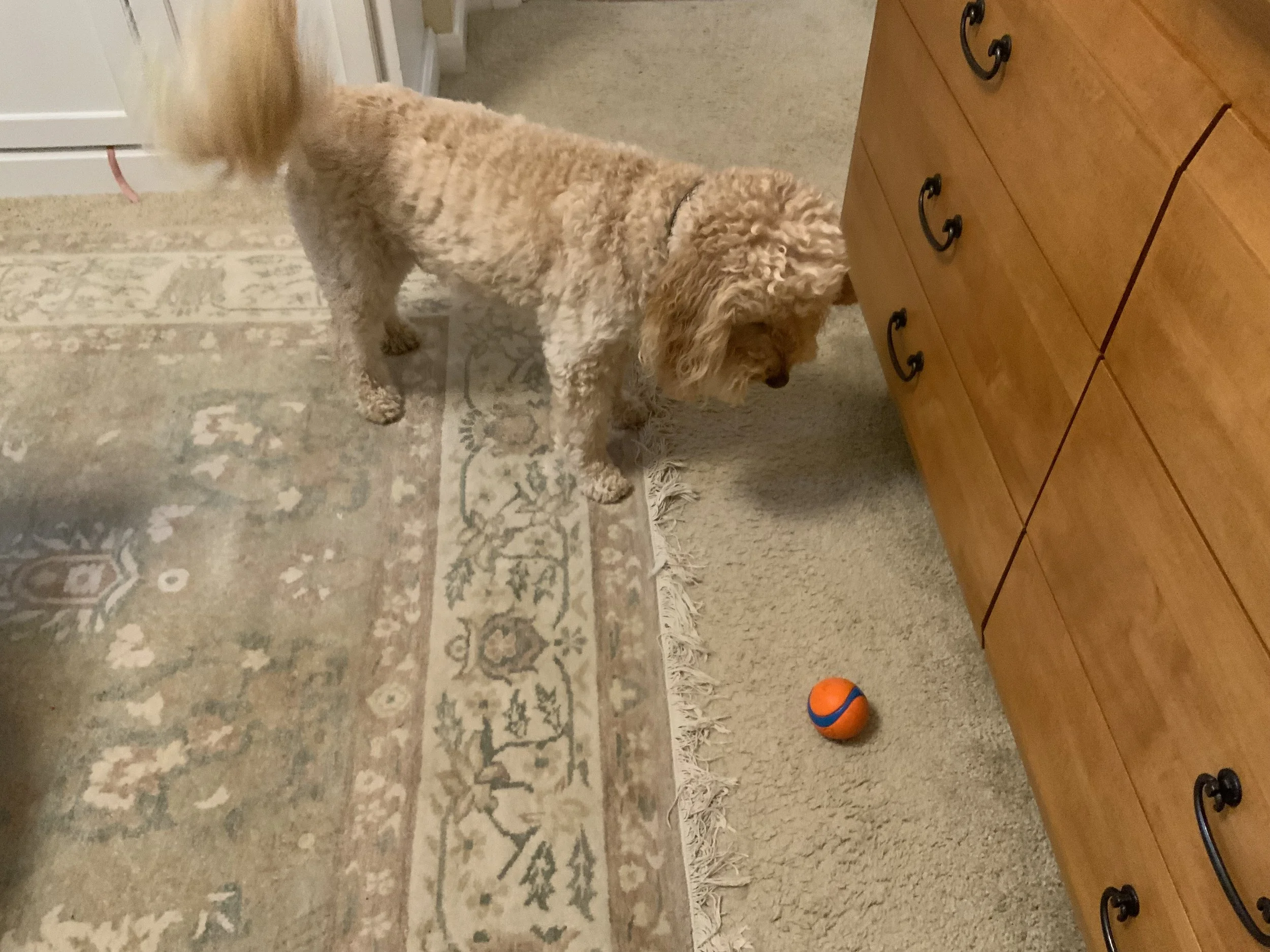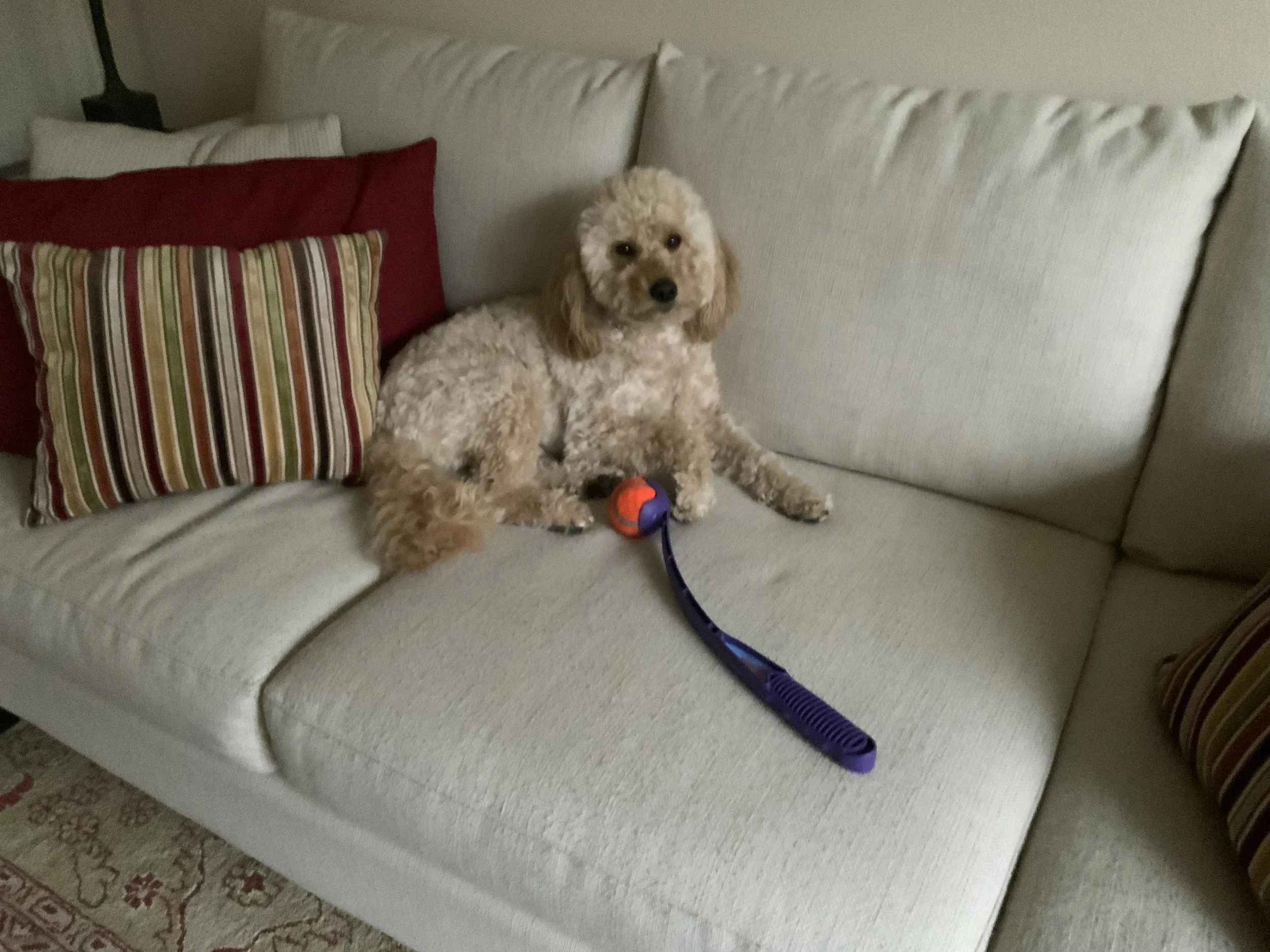#78 PUPPY - RETRIEVE (or not)
Scooter’s Happiness Regime begins about fifteen minutes after his night’s sleep ends. He retrieves the pair of my socks he’s buried in his bed, then moves from the bedroom to a living room chair upon which I (up for hours) settle. He jumps up beside me, stretches his front paws on the chair’s back to eye level David who has come, still in p.j.s, to stand by the chair. Every morning in this way Scooter’s body is stretched for collecting rubs, pats, and approval. He wiggles, and talks (with his mouth full), and tail-wags with the power of a Rolls Royce turbofan engine. That’s how his day starts. Predictable patterns keep dogs secure. Scooter’s morning ritual is predictable.
“What comes next?” I ask Scooter.
“Even before I eat, I check for the squirrel,” he says. His contribution to household chores is to keep his pillow in his bed, and chase the squirrel off the balcony.
Scooter’s cooperation with requests such as these, is mostly predictable: Sit. Stand. Down. Head down. Supine. Crawl. Foot. Sit pretty. Turn. Look. Walk. Back. Stop. Crawl. Come. Food. Leave it. Get it. Take it. Stay. Off (wait, staying off people needs work). Touch. Release. House. Speak. Quiet. Push. Bed. Hide. Catch. No. Jump up. Go Under. Jump down. Pillow, bed. Find Dad. Find Mom. Food.
“What are you getting at?” he asks.
“Your aversion to retrieving.”
“Oh, that.”
He’s not stupid, this Scooter Sublime. When he wants his Small Ball thrown, he brings it, drops it at our feet, does a bit of voicing, and waits. Expectantly.
Here, please, throw the Small Ball
When I want him to return the thrown ball to me, he demurs.
I’ve read the rules for teaching retrieve. I’ve tried the short distance throw, treats, praise, and patience. I’ve watched the videos. I’ve used reason. When he chooses to fetch the ball, he frequently takes it to his under-our-bed Doodle Cave and adds it to the stash already there: three pair of my socks, his fully-unstuffed chipmunk, the tug rope, and his Wabbit, recently relieved of its squeaker.
“Scooter, you watched some of the World Series games. You saw that when the ball sailed into the field, it was retrieved and returned to the pitcher.
I strengthened my point. “A 2000-year-old medicinal pill in a tin container was retrieved from a Roman shipwreck off the coast of Tuscany, Italy. The pill was made of a mixture of plant matter and other ingredients to treat eye problems. It is good to retrieve.
A. THE PILL TIN. B. THE PILL
And speaking of Retrieving! In 1991, more than 2,000 jellyfish polyps were sent into space. They not only survived, but by the time the mission was over in that microgravity environment, they had reproduced over 60,000 juveniles.
“They were retrieved,” I said. “You know, like getting the baseball back to a pitcher, or getting your Small Ball back to me. Sadly, the space-born jellyfish had no concept of up or down, so they had no idea how to swim. Vertigo, poor babies; no longer fit for earth.”
I added, “See how good retrieving can be?”
“I’m a gatherer,” Scooter says, leaning from his position on my desk to see the computer screen. “I’ve inherited the instincts to retrieve, herd, and hoard things. I prefer herding and hoarding.”
SCROLL DOWN TO COMMENT







